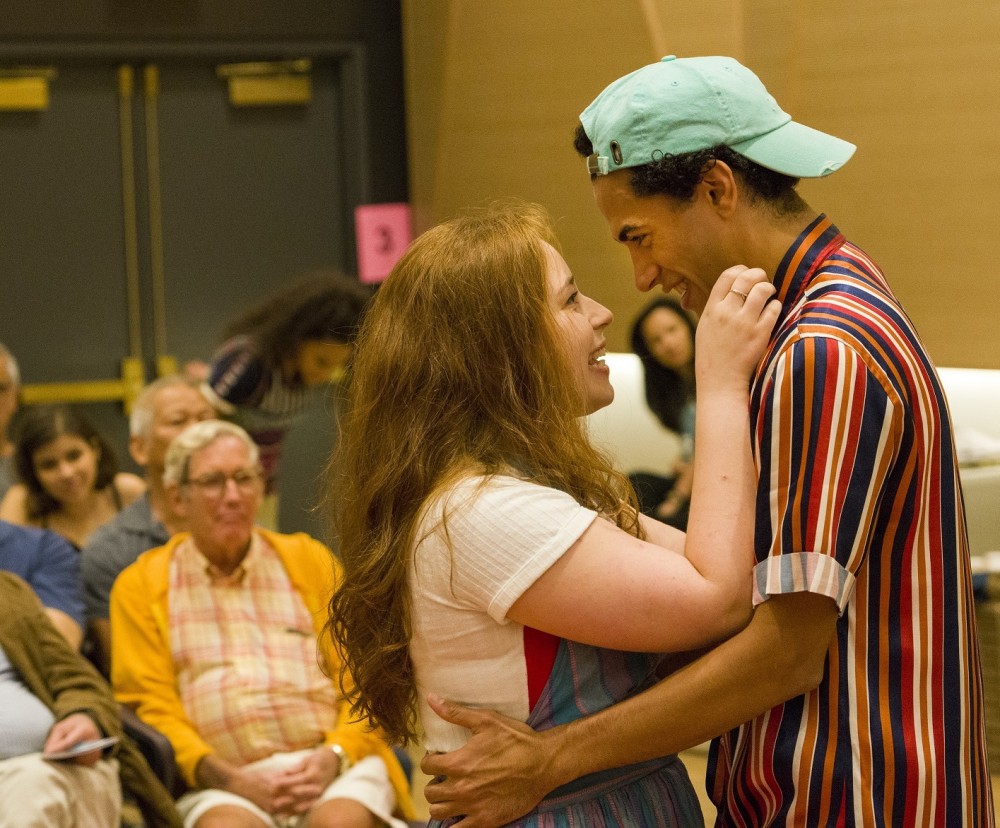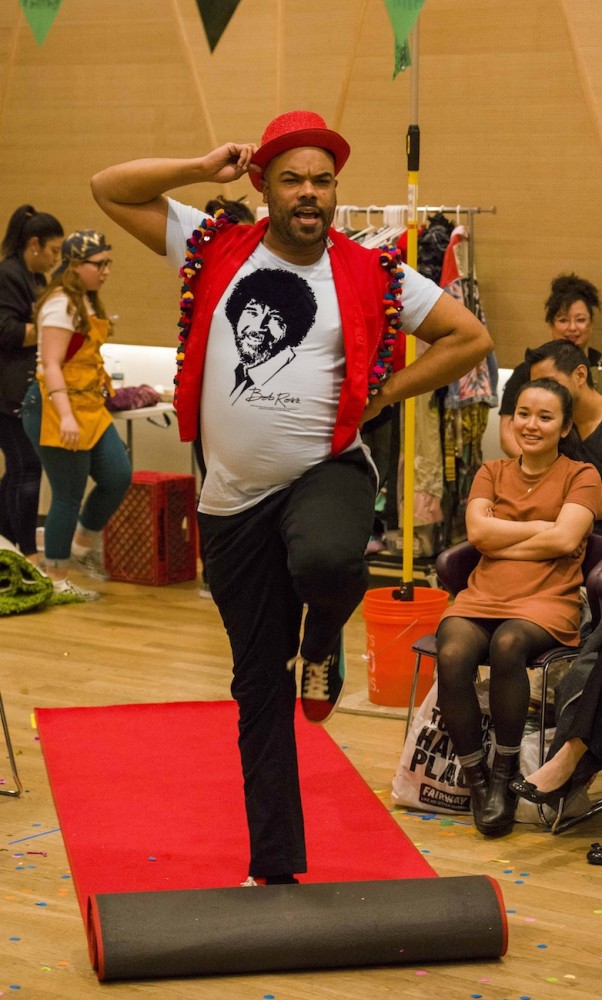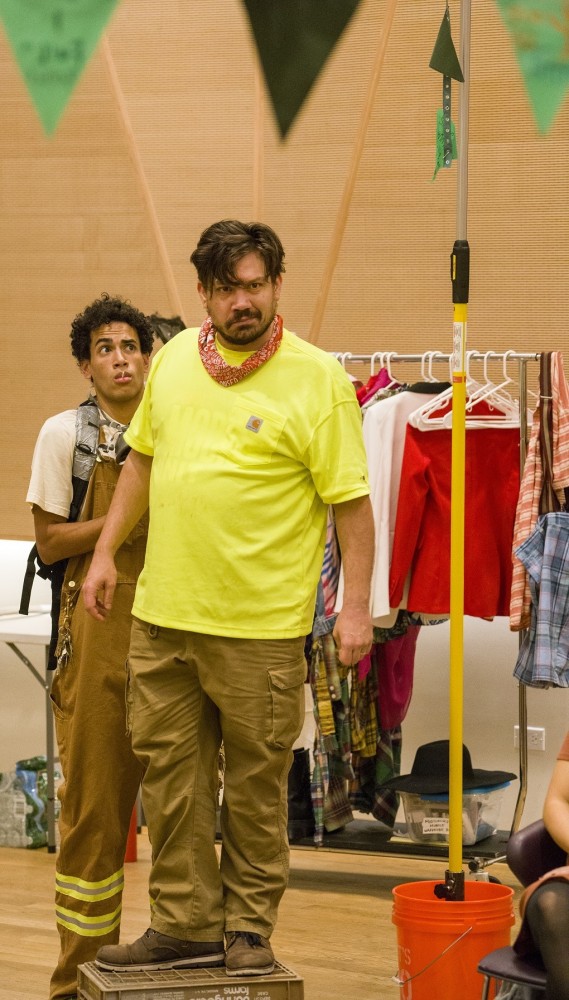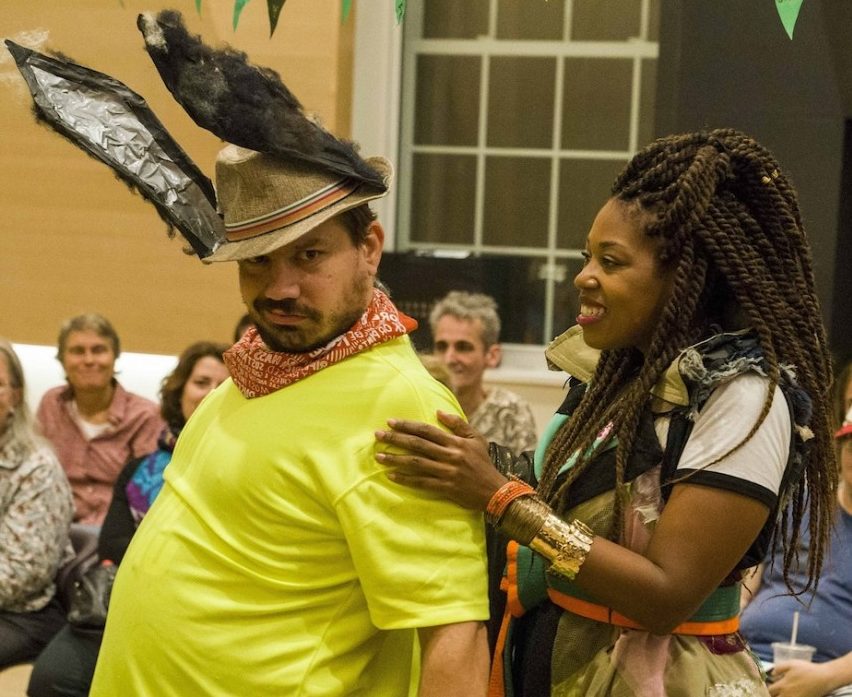
Carolyn Kettig, Jasai Chase-Owens
by JK Clarke
No matter the plaudits already heaped on the Public Theater’s Mobile Unit, it is time that the group be acknowledged by one or all of the major New York City theater organizations, from the Drama Desk to the American Theater Wing and so on. Let this be a clarion call to said groups to examine more closely the exceptional cultural value of the Mobile Unit’s bringing professional quality theater (specifically Shakespeare) to places it would not otherwise travel and to people who in some instances had never seen a stage play. The Mobile Unit (MU), formed over five decades ago, twice yearly takes a small company of actors and tours a Shakespeare play to various community centers in the New York City region. (Additionally, it has added a national tour of Lynn Nottage’s Sweat this year.) This season it has brought a delightful production of William Shakespeare’s A Midsummer Night’s Dream to 20 diverse venues, from the Brooklyn Metropolitan Detention Center to the Women’s Mental Health Shelter at the Lenox Hill Neighborhood House in Manhattan. The production has now returned home to The Public’s Shiva Theater where audiences are invited through November 17 to see the production for free.
Midsummer’s plot, as twisted as it can seem, is familiar to many and is really more of a framework on which is hung several delightful character sketches. A royal wedding is soon to take place between Theseus and Hippolyta, but chaos mars the preparations. A young noble girl, Hermia, elopes into the woods with her beloved because she has been promised to another and her father Egeus has enjoined Theseus to condemn her to death if she refuses the match. In the forest strange things abound: first, the Faerie King and Queen are playing out their own, mischievous romantic drama; and then there’s a group of workers, The Rude Mechanicals who are bumbling their way through rehearsals for a play they wish to present at the royal wedding. A number of ruses, confusions and shenanigans lead to hilarity . . . and eventually humble resolution and lessons learned.


David Ryan Smith
The MU productions are usually succeed on the strength of its dedicated actors, who bring so much heart and good will to their many roles:
MU veteran (to my count he’s been at least five MU productions, though it’s likely even more) David Ryan Smith is the standout in the company because of his consistency and ability to add unexpected dimension to secondary and even tertiary roles. He demonstrates this aptly in Midsummer, performing almost as a guardian angel to the rest of the cast, adding spice and simplicity to expository scenes that might otherwise be lost on an audience less versed in Shakespearean vernacular. His three roles are relatively minor: Egeus, a courtier; Quince, the organizer of the Rude Mechanicals; and an agglomeration of the multiple faerie roles (Peaseblossom, Cobweb, Mustardseed, etc) that for brevity have been reduced to one in this production. They’re essential, but by no means lead roles, yet Smith not only plays them as if they are; his characters augment every scene they’re in, through movements as simple as a raised eyebrow or a good natured harumph of disdain.
As Hermia and Starveling (one of the Rude Mechanicals), Carolyn Kettig has emerged as in this company as a delightful talent. Her Hermia is convincingly lovelorn and engaging, while her bored, eye-rolling and indignant worker Starveling adds more dimension and comedy to that character than we’re accustomed.


Christopher Ryan Grant
Then there’s Christopher Ryan Grant, who’s Bottom, the character mischievously turned into a braying Ass by Puck (a very fun Natalie Woolams-Torres) as part of Oberon’s scheme against his Queen. Grant is particularly adept at taking big comic roles (his Sir Toby Belch in the MU production of Twelfth Night was a scream) and delivering. Here he’s limited to a pair of ears to top off his Carhartt workers uniform, but physically embodies the donkey into which he’s been transformed both to his horror and delight.
Rosannay Zayas, Jasai Chase-Owens and Leland Fowler also deserve shout-outs for their performances, especially as the Mechanicals, all of whom are dressed (costumes Hahnji Jang) as some various form of modern day blue collar worker that you’d see on the streets of New York: bike messenger, coffee shop barista, utility worker, MTA employee, etc.


Director Jenny Koons, in her Mobile Unit directorial debut, has adeptly continued the spirit of the Mobile Unit, making the play into a party by beginning with an all-inclusive dance and ending with one as well. Sometimes the curtain call is forgotten in all the fun, as audience members are pulled onto the stage to dance to Top 40 hits. Koons has managed (no Dramaturge is credited, so the editing is presumably hers) to masterfully streamline A Midsummer Night’s Dream into a manageable 90 minutes in a way that calls no attention to the excised parts. Once again the Mobile Unit has managed to exceed expectations in unexpected and appreciable ways that really must be acknowledged out loud and in an official capacity. But even if that doesn’t happen they clearly make the impact where it counts: in the hearts and minds of those who had no prior knowledge of Shakespeare or even live theater. For them this production, like the others before it, will live on quite deservedly in their personal hall of fame forever.
A Midsummer Night’s Dream. Through November 17 at The Public Theater (425 Lafayette Street, at Astor Place). 90 minutes, no intermission. www.publictheater.org
Photos: Richard Termine






















